Nearly three-quarters of the population of Baidoa, Somalia, are internally displaced, and numbers are rising: nearly 30,000 displaced people have arrived in the city this year so far, straining an already-dire humanitarian situation.
In Somalia, an estimated 4 million people—or one-fifth of the population—face acute food insecurity; 3.8 million people are displaced from their homes; and 1.7 million children under five are acutely malnourished. The protracted humanitarian crisis behind these shocking figures is a result of ongoing conflict, climate-related disasters such as floods and droughts, recurrent outbreaks of infectious diseases, and high levels of poverty.
Climate instability
In 2023, the city of Baidoa, in the South West state of Somalia, suffered extreme climatic conditions, including the worst drought in 40 years and floods related to El Niño—a climate phenomenon associated with extreme weather events.
This has put a massive strain on the city’s already limited resources, particularly on water and sanitation services. As the rainy season approaches, the risk of outbreaks of waterborne diseases, including cholera, increases.
“There are about 1.1 million people in Baidoa and its surroundings. Of those, nearly 740,000 are internally displaced and the conditions they are struggling with are profound,” said Dr. Tammam Aloudat, president of Doctors Without Borders/Médecins Sans Frontières(MSF) in the Netherlands.

Inaccessible maternal health care
Somalia’s maternal and infant mortality rates are among the highest in the world, largely due to the limited access to medical care, which is exacerbated by droughts, floods, and heightened conflict. Displaced women and children living in camps are particularly at risk.
When residents fall sick or need medical care, many displaced people in Baidoa struggle to reach a health facility. “My sister was having labor pains but I could not take her to hospital to get medical care,” said Fatima*, a 23-year-old woman living in a camp in Baidoa. “Our biggest challenges are traveling on roads made impassable by flooding and insecurity, as well as the high cost of transport. We need better access to hospitals through ambulance services and good roads.”
With only two hospitals in Baidoa catering to the growing number of displaced people, there is an urgent need to strengthen primary health services to enable pregnant women to access essential care, reduce late referrals, and encourage women to give birth in medical facilities rather than in potentially unsafe conditions in their homes or shelters.
Responding to needs in Baidoa
MSF has been supporting Bay Regional Hospital in Baidoa since May 2018 to address the health care needs of women and children, reduce infant and pediatric mortality, and prepare for potential disease outbreaks. MSF teams provide a range of medical services to mothers and children in the hospital as well as through community-based clinics and through vaccination campaigns targeting pregnant women and newborn babies.
“We are making our services more efficient by building semi-permanent structures in seven outreach locations, where we are providing basic prenatal care; treatment for diarrhea, respiratory tract infections, and malaria; health promotion activities, and referrals,” said MSF head of programs Dr. Pitchou Kayembe.
It is not only in Baidoa that health services are struggling. The humanitarian crisis and the rising numbers of displaced people are putting pressure on health care providers countrywide, including aid organizations. As patient numbers and costs increase, insecurity has disrupted the provision of medical and humanitarian aid.
“We urge all humanitarian organizations in Baidoa to work in a coordinated manner to address the unmet needs of displaced people in terms of food, shelter, clean water, and access to health care, and to invest more in strengthening capacity to respond ahead of the upcoming rainy season,” added Dr. Kayembe.

Aid shortfalls
According to the United Nations Office for the Coordination of Humanitarian Affairs, 6.9 million people in Somalia need humanitarian assistance in 2024. The humanitarian response plan requires $1.6 billion in funding, but there is a funding gap of $1.4 billion. Among the few humanitarian organizations in South West state of Somalia that are addressing the needs of displaced people, better coordination is needed to optimize the available resources.
Despite cuts to humanitarian funding in Somalia, MSF remains committed to continuing our work in South West state, which has just one referral hospital and two general hospitals serving the entire region.
“We are seeing a lot of media coverage about emergencies like Gaza, Sudan, and Ukraine—all of which are catastrophic and require humanitarian assistance and attention—but that must not come at the cost of less visible emergencies or continued protracted crises such as that in Somalia,” added Dr. Aloudat.

Our work in Somalia
For more than four decades, MSF has helped address the humanitarian and health needs of Somali communities. In 2023, MSF teams worked in Hargeisa, Sool, Galkacyo North, Galkacyo South, Baidoa, and Dhobley, treating more than 2,000 children for malnutrition and more than 15,000 patients for acute watery diarrhea, and providing more than 200,000 outpatient consultations. Currently, MSF teams are actively engaged in responding to health needs in Galkacyo North, Galkacyo South, and Baidoa.
*Name changed to protect privacy




